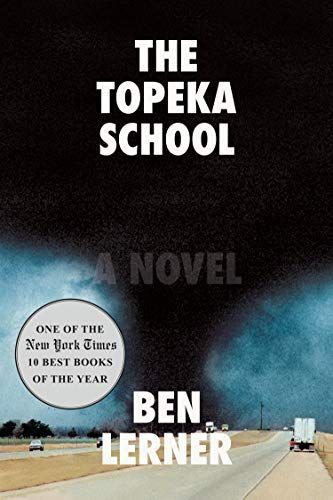
The Topeka School A Novel
A NEW YORK TIMES, TIME, GQ, Vulture, and WASHINGTON POST TOP 10 BOOK of the YEAR ONE OF BARACK OBAMA'S FAVORITE BOOKS OF THE YEAR ALSO NAMED ONE OF THE BEST BOOKS OF THE YEAR BY: Esquire, NPR, Vogue, Amazon, Kirkus, The Times (UK), Buzzfeed, Vanity Fair, The Telegraph (UK), Financial Times (UK), Lit Hub, The Times Literary Supplement (UK), The New York Post, Daily Mail (UK), The Atlantic, Publishers Weekly, The Guardian (UK), Electric Literature, SPY.com, and the New York Public Library From the award-winning author of 10:04 and Leaving the Atocha Station, a tender and expansive family drama set in the American Midwest at the turn of the century: a tale of adolescence, transgression, and the conditions that have given rise to the trolls and tyrants of the New Right Adam Gordon is a senior at Topeka High School, class of ’97. His mother, Jane, is a famous feminist author; his father, Jonathan, is an expert at getting “lost boys” to open up. They both work at a psychiatric clinic that has attracted staff and patients from around the world. Adam is a renowned debater, expected to win a national championship before he heads to college. He is one of the cool kids, ready to fight or, better, freestyle about fighting if it keeps his peers from thinking of him as weak. Adam is also one of the seniors who bring the loner Darren Eberheart—who is, unbeknownst to Adam, his father’s patient—into the social scene, to disastrous effect. Deftly shifting perspectives and time periods, The Topeka School is the story of a family, its struggles and its strengths: Jane’s reckoning with the legacy of an abusive father, Jonathan’s marital transgressions, the challenge of raising a good son in a culture of toxic masculinity. It is also a riveting prehistory of the present: the collapse of public speech, the trolls and tyrants of the New Right, and the ongoing crisis of identity among white men.
Reviews
katie h.@caterhine
Chris Dailey@cris_dali
Andrew Reeves@awreeves
Will Vunderink@willvunderink
Ethan Hill@localhero
Fraser Simons@frasersimons
Athena Eloy@athenaeloy
Katarzyna Karpinska@anekse
Anna Jacobs@annaljacobs27
Tarannum Kamlani@tarannumsaurus
Colton Ray@coltonmray
daniela@ooorangemoon
Karolina Klermon-Williams@ofloveandart
Nicholas Barnard@coldfruits
Becca M@becmarotta
Kyle Curry@kcurry24
Jeff Roche@jeffroche
Dennis Jacob Rosenfeld@rosenfeld
Anvar Cukoski @anvar
Blake Powers@bpowers
heleen de boever@hlndb
Lexie @lexieneeley
Joshua Line@fictionjunky
Jacob Mishook@jmishook
Highlights
katie h.@caterhine